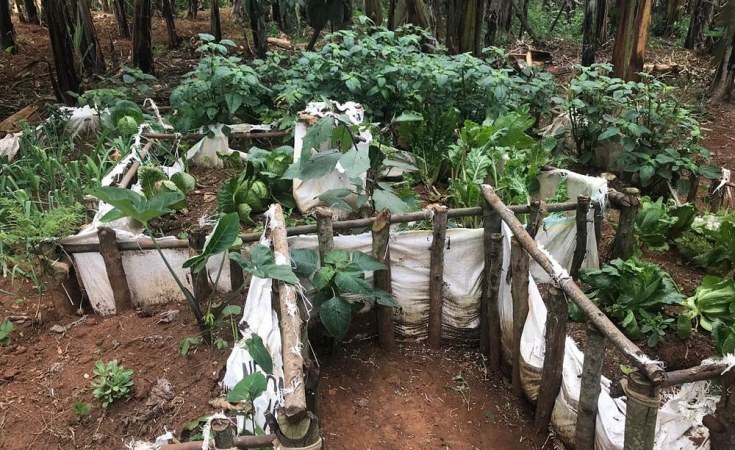As Rwanda continues its efforts to address malnutrition, the family of Fiacre Ibambe, residing in the Rutsiro district of Western Rwanda, is still dealing with the consequences of undernutrition. "He looks fine today but it has been a challenge for a long time. We were not educated enough on how to prepare a healthy diet for him," said his father, Elias Vuningoma.
Stunting is a form of undernutrition associated with inadequate feeding, eating foods that lack growth-promoting nutrients, and persistent infections or chronic diseases that cause poor nutrient intake in infants and young children during their early years. According to the Rwanda Demographic and Health Survey (RDHS) conducted in 2020, stunting rates are highest in the poorest households, particularly among those living in rural areas. The survey revealed that 36% of children under five in rural areas were stunted as opposed to 20% of children under five in urban areas. The RDHS also reports that stunting generally increases with age, peaking at 40% among children aged 24-35 months.
Vuningoma's kitchen garden
One of the measures the Government of Rwanda proposed to address micronutrient deficiencies is the adoption of kitchen gardens. This initiative has been recognised as a viable solution to assist families who lack access to sufficient food and proper nutrition. As a result, kitchen gardens "Akarima k'igikoni" (in the vernacular Kinyarwanda language) have become quite popular in Rwanda. Since the onset of the pandemic, hundreds of kitchen gardens have been established throughout the country. The main purpose of kitchen gardens is to provide a balanced diet at a low cost.
After learning about the cause of his son's condition and the fact that it could be addressed by ensuring that he was fed a balanced diet, Vuningoma started cultivating a kitchen garden using polythene bags as makeshift plant pots where he grew vegetables like cabbage, amaranth, onions, and tomatoes amongst others. "I embraced the practice a few months ago after realising this was a real solution to prevent malnutrition affecting mostly children and decided to implement it," he said.
According to Vuningoma, Fiacre now eats a nutritious diet that includes different varieties of vegetables, in addition to potatoes which were a staple meal for the family. Nutritious meals enable some children and adolescents to "catch up" on growth after stunting in early childhood. Fiacre's father believes that he is catching up, especially because he adopted some new techniques that allow him to plant more vegetables and produce a more viable yield in his kitchen garden.
A home-grown solution
Kitchen gardens are relatively easy to cultivate and with these three basic requirements: sun, water, and good soil quality, a kitchen garden can yield a healthy and abundant harvest. As a result of the promotion of kitchen gardens across all 30 districts of Rwanda, households in several remote rural areas are now repurposing old tyres, and plastic containers as a sustainable and creative way to grow their food. Residents of Boneza, a mountainous village in Rutsiro district of Western Rwanda, were able to address malnutrition in their families and reduce their reliance on costly purchases of vegetables from local markets, by growing them in their backyard.
Jacqueline Mukakabayiza, a mother of five from Rutsiro District, revealed that in many rural villages, mothers struggle to provide adequate nutrition for their families due to a lack of knowledge. Many wrongly believe that nutritious foods, such as vegetables, are inaccessible. Mukakabayiza said her approach to feeding her family changed after her fourth child was admitted to a nearby nutrition centre. At the centre, mothers were trained on how to address the nutrition knowledge gap and provide proper nutrition for undernourished children. After attending the training, she began cultivating a vegetable garden, which now provides her family with fresh vegetables to add to their meals.
According to Esther Mukanoheli, a nutritionist at Mugonero Hospital in Western Rwanda, the main challenge for vulnerable families to tackle malnutrition is that most people do not know the nutritious meals to eat. "Much effort is needed to sensitise poor residents to have kitchen gardens and which appropriate crop to grow," she said.
Dealing with a pest problem
Vegetable gardens have become a primary source of nutrient-dense vegetables for many households in rural Rwanda. Vuningoma and Mukakabayiza both agree that "these little gardens are playing an ever-increasing role in improving eating habits and well-balanced diet for most remote rural households, affected by malnutrition". However, pests and insects pose a significant threat to these garden vegetable plants, causing extensive damage.
While Vuningoma has successfully produced high-quality amaranth, he still faces challenges with some of his vegetables not being as productive as he would like. He believes this may be due to a lack of necessary nutrients. "Garden maintenance tasks such as irrigation have been another challenge to a fresh harvest," he added.
The stunting prevention and reduction programme
Efforts to tackle malnutrition in Rwanda go beyond promoting kitchen gardens. The state of nutrition in the country is promising as both the government and various local and global partners are actively engaged in addressing nutrition challenges in the country. One of the key initiatives is the Rwanda Stunting Prevention and Reduction programme, which aims to reduce the stunting rate among children under five from 38 per cent to 19 per cent by 2024.
The programme is focusing on children under the age of two, who are most vulnerable to malnutrition and aims to promote exclusive breastfeeding, improve the quality of complementary foods, and increase access to essential nutrients such as vitamins and minerals. However, sustained efforts and investments will be required to achieve the programme's goal of reducing stunting among children under the age of five by 2024.


